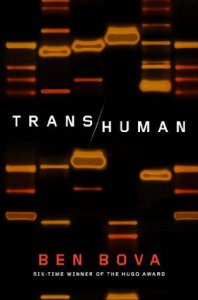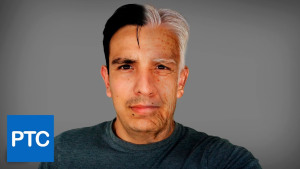[Note: The following was originally published as “Lead, Follow, or Get Out of the Way” on my ‘A View from the Right’ blog, but the source and subject matter fall under “science-fiction” (for now). So, I thought you all might appreciate it, as well.]
This blogpost is probably not about what you think it’s about.
Based on the title — a phrase variously attributed to Thomas Paine, George S. Patton, Laurence J. Peter, and “Anonymous” –, one would most likely think it is about leadership in general, or maybe with a business/entrepreneurship or military emphasis. It’s not. The title is from a chapter in the science-fiction novel Transhuman by Ben Bova, and the subject is about the human lifespan and the potential impact of medical/genetic technology that would greatly increase our longevity. In context, then, the title refers to the scientific and political/economic aspects to such a development, but also the societal changes overall. (I guess there is a business aspect, too, come to think of it.)
 Many people like to dream about how great it would be if they lived a couple hundred years or more instead of mere decades — preferably in good health, of course. But, we don’t often think through what the effects on modern society might be. It’s an intriguing topic, and I thought that Bova (via his characters) hit on some interesting points. Not every area that would be affected, of course, but some. I considered trying to summarize it all, but it works much better as played out between the characters. So, I decided to cite (with minor edits) some of the conversation from the book. Hope you find it interesting….
Many people like to dream about how great it would be if they lived a couple hundred years or more instead of mere decades — preferably in good health, of course. But, we don’t often think through what the effects on modern society might be. It’s an intriguing topic, and I thought that Bova (via his characters) hit on some interesting points. Not every area that would be affected, of course, but some. I considered trying to summarize it all, but it works much better as played out between the characters. So, I decided to cite (with minor edits) some of the conversation from the book. Hope you find it interesting….
—
SPOILER! SPOILER! SPOILER! SPOILER! SPOILER!
“Do you realize what you’ve done?” Rossov snarled…. Shaking his head, Rossov said, “I don’t think you understand what you’ve let loose. Curing cancer. All sorts of people living past a hundred. It’s a disaster.”
“It’s a revolution,” said Luke. “What the hell are you so spooled up about? This is the best news the human race has had since… since Watson and Crick unraveled DNA.”
Rossov moaned. “Death rate going down. Lifetimes doubling. That’s a disaster, Abramson! A f_____ disaster!”
Genuinely puzzled, Luke asked, “What the hell are you talking about?”
“You’ve ruined Social Security. We’re already going broke with Medicare. And the whole insurance industry, too. You’ve wrecked the American economy.”
“Bull____.”
Jabbing a finger at Luke, Rossov insisted, “The economy can’t survive having a nation full of centenarians! It’ll break the bank.”
Luke felt growing anger simmering inside him. These chowderheads don’t understand, he realized. They don’t understand anything at all.
He rose slowly to his feet. “You just don’t get it, do you? You can’t stop this. You can’t put a cork in scientific knowledge. What I’ve done is just the tip of the iceberg. We have the knowledge, the power, to transform the human race.”
“And ruin the country.”
“Change the country. Change the world.” Luke started to pace across the office, but his ankle flared and he sank back onto his chair. Still, he continued. “We’re going to be able to extend human life spans indefinitely, sooner or later. Prevent genetic diseases like cancer, Alzheimer’s, Parkinson’s. Stem cell therapies will repair failing hearts, rebuild nerves and any other tissue that’s been damaged, regrow limbs that have been lost –“
“By killing fetuses,” Rossov growled.
Luke waved the thought away. “We don’t need fetal stem cells. We can take stem cells from your own body. Or regress skin cells to become stem cells.”
“I’ve read reports on that,” said Colonel Dennis.
Turning in his chair to face Rossov squarely, Luke said, “You think we’re going to have a country full of pathetic, creaking old geezers. Well, that’s wrong. Look at me! I’ll be seventy-five in a couple of months, but somatically — physically — I’m like a forty-year-old. And I’m going to stay this way for a long time.”
“That’s the f_____ problem,” Rossov muttered. “Millions of people living to a hundred and more….”
“It’s not a problem,” Luke countered. “We’re entering a new era…. What I’m telling you is that people will be healthy and vigorous all their lives. So they live to be a hundred and fifty, two hundred, so what? They won’t need Social Security or Medicare. They’ll be working, going back to school, starting new careers for themselves.”
Fisk’s eyes narrowed. “They’ll continue to be consumers.”
“Damned right,” said Luke. “They’ll continue to buy cars, homes, take vacation, overseas trips–“
“Have babies,” said the colonel.
“You just don’t understand,” Rossov repeated. “You think your transhumans are going to give up their Social Security benefits, their Medicare, their pensions just because they’re feeling spry and healthy? In your dreams! This is going to destroy the economy.”
“No,” Luke replied. “It’s going to change the economy. And you politicians are going to have to make some real changes to Social Security and Medicare and the rest.”
“Change them? That’s impossible. Political suicide.”
“Then we’re going to have to find political leaders who can make it possible.”
Rossov glared at him.
“Besides,” Luke went on, “this isn’t going to happen all at once. We’ve still got a lot of work to do. You won’t start to see any major effects for another five, ten years.” …
Luke pointed out, “I’m not the only one working in this area. Sure, I’m ahead of all the others, but sooner or later some bright researcher would hit on the same idea. You can’t control everybody. You can’t stop people from thinking, learning.”
Rossov muttered, “And you can’t drop a bombshell like this without dislocating the economy. We’re having a tough enough time keeping Social Security and Medicare properly funded. Now…” He sank his head into his hands.
“Now,” Luke took up, “you’re going to have to get those egomaniacs in Washington to do the jobs they were elected to do. You’ve got at least five years to do it, maybe ten. Instead of trying to stop this transformation, get to work and prepare for it.”
“You’ve never tried to work with the Congress,” Rossov moaned. “You’ve never tried to move the bureaucracy.”
Luke snapped, “Then get out of the way, buster, because the change is coming, whether you like it or not.” …
Rossov looked dubious, but Fisk went on grandly. “Transhumans. It’s exciting. People staying young, vigorous past a hundred. Active.” [To Luke, he said,] “You’re still under contract to me, you know.” … Fisk’s tentative smile widened into a happy grin.
“So you peddle your fountain of youth to the masses,” Rossov growled.
“That’s right,” said Fisk. “And you start getting the government ready for the changes that are coming.” …
“What choice do I have?” Rossov said bleakly.
“No choice at all,” said Luke. “The change is coming. Either you take credit for it and try to lead the country or you’ll get rolled under by it.”
“It’s impossible,” Rossov muttered. “You have no idea how impossible it is.”
Luke shook his head at him. “Listen, pal, you either lead, follow, or get out of the way.”
—
 Rossov isn’t exactly the most sympathetic character in the novel, but I had to chuckle sympathetically at his frustration in this scene. Not only does he need to come around to a new way of thinking, but as the White House’s representative, he needs to get the President on board and then will likely be tasked with getting entrenched politicians, lobbyists, and Washington bureaucrats to wake up to the new reality, too. Poor guy!
Rossov isn’t exactly the most sympathetic character in the novel, but I had to chuckle sympathetically at his frustration in this scene. Not only does he need to come around to a new way of thinking, but as the White House’s representative, he needs to get the President on board and then will likely be tasked with getting entrenched politicians, lobbyists, and Washington bureaucrats to wake up to the new reality, too. Poor guy!
This excerpt only briefly touched on matters such as ethics and responsible science. (For example, just because a thing can be done does not mean is should be done.) The book examines some of these questions a bit more but also raises others. There are also the very practical matters of how to implement the life-sustaining treatments going forward, especially since there will be limited supplies, great expense, a variety of reactions by the populace, etc. Quite a complicated mess, both ethically and practically, if you ask me. And figuring out the answers is “way above my pay grade”, though I might return to the topic at some point.
Meantime, give the book a try, whydontcha? It’s a pretty good read — or, listen on audiobook (as I did).
Advertisements Share this:




